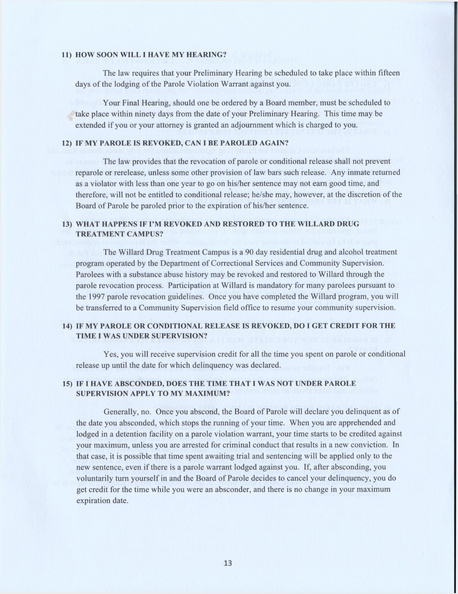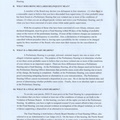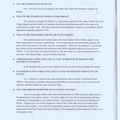
11) HOW SOON WILL I HAVE MY HEARING?
The law requires that your Preliminary Hearing be scheduled to take place within fifteen days of the lodging of the Parole Violation Warrant against you.
Your Final Hearing, should one be ordered by a Board member, must be scheduled to take place within ninety days from the date of your Preliminary Hearing. This time may be extended if you or your attorney is granted an adjournment which is charged to you.
12) IF MY PAROLE IS REVOKED, CAN I BE PAROLED AGAIN?
The law provides that the revocation of parole or conditional release shall not prevent reparole or rerelease, unless some other provision of law bars such release. Any inmate returned as a violator with less than one year to go on his/her sentence may not earn good time, and therefore, will not be entitled to conditional release; he/she may, however, at the discretion of the Board of Parole be paroled prior to the expiration of his/her sentence.
13) WHAT HAPPENS IF I’M REVOKED AND RESTORED TO THE WILLARD DRUG TREATMENT CAMPUS?
The Willard Drug Treatment Campus is a 90 day residential drug and alcohol treatment program operated by the Department of Correctional Services and Community Supervision. Parolees with a substance abuse history may be revoked and restored to Willard through the parole revocation process. Participation at Willard is mandatory for many parolees pursuant to the 1997 parole revocation guidelines. Once you have completed the Willard program, you will be transferred to a Community Supervision field office to resume your community supervision.
14) IF MY PAROLE OR CONDITIONAL RELEASE IS REVOKED, DO I GET CREDIT FOR THE TIME I WAS UNDER SUPERVISION?
Yes, you will receive supervision credit for all the time you spent on parole or conditional release up until the date for which delinquency was declared.
15) IF I HAVE ABSCONDED, DOES THE TIME THAT I WAS NOT UNDER PAROLE SUPERVISION APPLY TO MY MAXIMUM?
Generally, no. Once you abscond, the Board of Parole will declare you delinquent as of the date you absconded, which stops the running of your time. When you are apprehended and lodged in a detention facility on a parole violation warrant, your time starts to be credited against your maximum, unless you are arrested for criminal conduct that results in a new conviction. In that case, it is possible that time spent awaiting trial and sentencing will be applied only to the new sentence, even if there is a parole warrant lodged against you. If, after absconding, you voluntarily turn yourself in and the Board of Parole decides to cancel your delinquency, you do get credit for the time while you were an absconder, and there is no change in your maximum expiration date.


0 comments